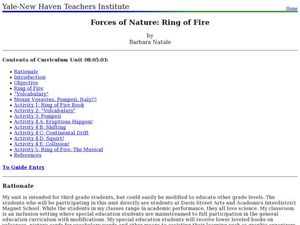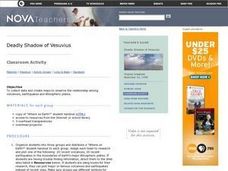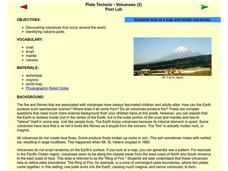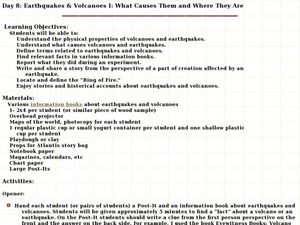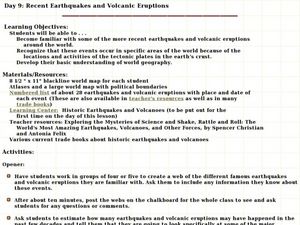Curated OER
The Volcano Factory
Students examine the process of tectonic plates and why the Mariana Arc is active with volcanoes. They create a model of the Mariana Arc out of clay.
Curated OER
Slinky Lab- Simulating the Motion of Earthquake Waves
Sixth graders simulate primary and secondary waves. In this earthquakes waves lesson, 6th graders experiment using a slinky to gain understanding of how waves are created during an earthquake. Students record observations in drawings....
Curated OER
Volcano's Deadly Warning
Students view a video clip on volcanoes. They work together to discover the concept of sine waves. They plot points on a chart and connect them to create the complex wave. They answer questions to complete the lesson.
Science Matters
Earthquake Waves: Wave Notes
A multi-part lesson opens with a review of p waves and s waves. Then scholars use a simple s wave simulator to view the way the wave travels. Next, pupils use cups and various fluids to simulate p waves moving through different...
Curated OER
Earthquakes and Volcanoes
Students explore plate tectonics, earthquake faults, and the types of volcanoes.
Curated OER
Tectonic Plates, Earthquakes, and Volcanoes
Challenge geography classes to locate the major volcanoes and earthquake faults on a world map. In groups, they identify the pattern made and examine the relationship between the locations of the faults and volcanoes and tectonic...
Science Matters
Richter Scale
The 12th lesson in a series of 20 opens with a demonstration of exponential functions using pasta. This concept is connected to the Richter Scale, which is also an exponential function. Scholars compare the exponential scale that...
Science Matters
Finding the Epicenter
The epicenter is the point on the ground above the initial point of rupture. The 10th lesson in a series of 20 encourages scholars to learn to triangulate the epicenter of an earthquake based on the arrival times of p waves and s...
Curated OER
Building for the Big One
Students build and test structures that can best withstand earthquakes. They create their structures from playdough, cornstarch, grape-nuts and popsicle sticks and place their structures on a "shake table."
Curated OER
Forces of Nature: Ring of Fire
Third graders will research the Ring of Fire and be able to share their findings with their partner. They will also demonstrate volcanic eruptions using a baking soda and vinegar volcano model. Then they will discover how continental...
Science Matters
Slip Sliding Along
The San Andreas Fault is the largest earthquake-producing fault in California. In the seventh lesson in the 20 part series, pupils create maps of California, focusing on the San Andreas Fault system. The comparison of where...
Science Matters
Wave Watching
Seismologists use the direction and arrival times of p waves and s waves to determine the distance to the source of an earthquake. The engaging activity has students line up to form human waves. Through different movements when attached,...
Curated OER
Rock My World
Students conduct a hands-on experiment designed to demonstrate how continents and oceans formed and why the manner of formation is relevant to a study of volcanoes.
Curated OER
Deadly Shadow of Vesuvius
Students view a video clip about volcanoes. They collect data and create maps to see the relationship between volcanoes, earthquakes and plates. They share their maps with the class.
Curated OER
Earthquakes And Volcanoes
Students investigate the concept of plate tectonics through focusing a research study upon the occurrence of earthquakes and volcanic eruptions. They find information that is used for class discussion. Students complete a mapping of...
Curated OER
Plate Tectonic - Volcanoes (1)
Students learn the different shapes of Volcanoes and discuss why volcanoes only have a few shapes.
Curated OER
Model Volcanoes
Young scholars discover what causes earthquakes, volcanoes and floods. Using this information, they discuss how these natural disasters change the surface of the Earth. In groups, they make models, draw pictures and make them erupt.
Curated OER
Volcanoes
Second graders review the characteristics and aspects of volcanoes. Using this information, they write a creative story and draw illustrations to accompany the words. They use geographical terms to describe a location and the physical...
Curated OER
Social Studies: San Francisco Earthquake
Students discover details about the San Francisco earthquake of 1906. In this natural disaster lesson, students visit selected websites to analyze primary sources related to the personal accounts of the earthquake. Students then discuss...
Curated OER
Plate Tectonic - Volcanoes Post Lab
Second graders discover volcanoes that occur around the world. They identifying volcano parts.
Curated OER
Earthquakes & Volcanoes I: What Causes Them and Where They Are
Students study the properties of volcanoes and earthquakes. In this earthquakes and volcanoes lesson students write a story on what they did during their experiment.
Curated OER
Volcano!-Is That a Volcano on Your Plate?
Young scholars explore how and where volcanoes form. They also explore how the interactions between oceanic and continental crust create volcanoes and other mountains and earthquakes in a simulation activity using cardboard of two...
Curated OER
Recent Earthquakes and Volcanic Eruptions
Young scholars study the recent earthquakes and volcanic eruptions. In this recent earthquakes lesson students complete an activity while working in groups.
Curated OER
Volcano Live
Students discover the inevitable threat of volcanoes as they identify the ring of fire. In this natural disasters lesson, students examine the tectonic plate theory and discuss how magma works it's way to the surface of the Earth....











